Ivana Eva Costa
Teología, política y poética
del primer motor inmóvil (2013)
Link to the original text:
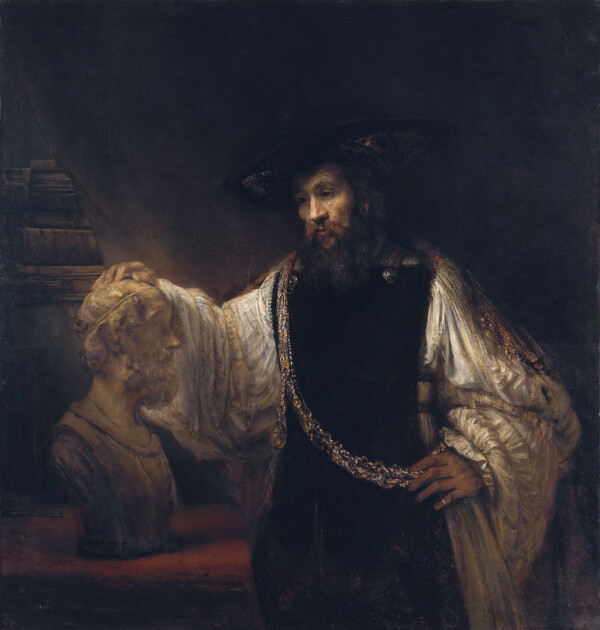
Aristitle with a bust of Homer, Rembrandt
Ivana Eva Costa is professor of Ancient Philosophy in the University of Buenos Aires. She also works as a journalist and translated works such as Machiavelli’s The Prince or Plato’s Lysis. She has published many articles on Ancient Philosophy, some of which can be read in her Academia.edu profile (uba.academia.edu/IvanaCosta). I would like to thank Ivana for allowing me to translate this work into English and for kindly sharing her knowledge.
Theology, politics and poetics of the unmoved prime mover
In the last two lines of Metaph. XII, concluding his discussion of the separate, unmoved ousia, and emphasising the necessary unity of the first principle, Aristotle introduces a Homeric quote: “The rule of many is not good; let one be the ruler” (Iliad II, 204). This quotation —also appearing in Pol. 1292 a 13— was read in a theological-political light, mainly in imperial times. My purpose here will be to come back to it, but relating it to other quotes or references to Homer introduced by Aristotle to conclude his reflections on god or the gods (De Philosophia, fragments 12a, 12b, and 13 Walzer) and on the prime mover (De Motu Animalium 4, 699b35-700a2). Given that the Aristotelian penchant for Homeric poetry —widely attested throughout the entire corpus— has no single purpose or topic, I intend to focus on this series, wherein poetry helps to outline the characteristics of theology’s subject matter. I would like to show here that Homer’s quotations are no casual part of the philosophical arguments by which Aristotle deduces the existence and necessity of a single, separate, and unmoved first principle. The recourse to Homer’s poetry —not any poetry, but this poetry1— is no mere ornament; even though, in a very general sense, we may ascribe it a rhetorical use (whether because of the direction in which the audience’s attention is focused or because of its persuasive force), the cited verses carry implicit information which perfects Aristotle’s demonstration, offering proofs which are not to be found in the other argumentative strategies employed, in each case, to define metaphysics’ subject in its theological version.
1. The Homeric quote in XII 10, 1076 a4
Aristotle quotes verses by Homer some 134 times2. At least four of these references are intended to stress one or many characteristics defining the first principle. One of them is given at the end of Metaph. XII, which, as is known, is the book dedicated to showing the necessary existence of a separate ousia, the principle which sustains the whole universe. After briefly reviewing the characteristics of the sensible ousia (in the first five parts of the treatise), in Chapters 6 and 7 Aristotle argues that there must be an eternal mover, which being unmoved causes everything else to move, pure intellectual activity, necessary and beautiful principle, excellent and perfect life. After pondering upon this and other specific matters in Chapters 8 and 9, in the last section he intends to explain how does the good exist in the universe, whether it is transcendent, immanent, or both at the same time. In order to explain his position, Aristotle takes two metaphors: firstly, a military one; secondly, a domestic one (on the free man’s role within the oikos). The first metaphor says:
We must consider also in which of two ways the nature of the universe contains the good or the highest good, whether as something separate and by itself (kechorisménonti kai autókath’autó), or as the order (táxin) of the parts. Probably in both ways, as an army does. For the good is found both in the order and in the leader, and more in the latter; for he does not depend on the order but it depends on him [Transl. D. Ross, except when indicated otherwise].
In the following lines, Aristotle refers to the immanent order also existing in the universe, albeit dependent upon the first principle. He explains that, as it occurs in the army and in domestic organisation, the hierarchical disposition within the cosmos is such that its pinnacle is characterised by the greatest determinacy and the highest degree of responsibility in coordinating the entire system, while in the bases there is an increasing degree of indeterminacy and an abstention regarding the full realisation of the whole. Aristotle says:
And all things are ordered together (syntétaktai) somehow, but not all alike —both fishes and fowls and plants; and the world is not such that one thing has nothing to do with another, but they are connected. For all are ordered together to one end. (But it is as in a house, where the freemen are least at liberty to act as they will, but all things or most things are already ordained for them, while the slaves and the beasts do little for the common good, and for the most part live at random; for this is the sort of principle that constitutes the nature of each) (1075 a 15-20).
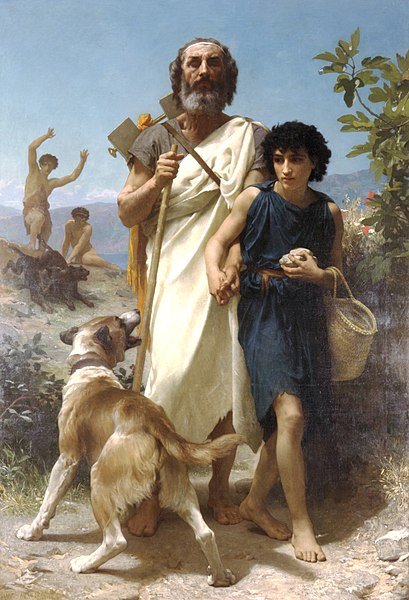
Homer and his guide, William-Adolphe Bouguereau
Those who do not adhere to this integrated view, continues Aristotle, are bound to absurdity. For instance, those who affirmed that the principles are the opposites: that is, some pre-Socratics and some philosophers of the Platonic Academy, for whom the principles are the one-good and the dyad-matter-evil. They do not explain how things are produced by the opposites, and they also make everything but the one to take part in evil. Later, he criticises Empedocles more specifically, and he attacks once again the Academics: both those who identify the Ideas as principles and those who identify mathematical entities as such. Among these, Speussipus goes so far as to conceive of “the ousia of everything” as a succession of disconnected episodes. But on the contrary, asserts Aristotle asserts that “the world must not be governed badly” (tà dé ónta ou boúletai politeúesthai kakôs), and he cites Homer (Il. II, 204): “The rule of many is not good (ouk agathòn polykoiraníe); let one be the ruler (heîs koíranos esto)”.
This is undoubtedly a great ending, a phrase bound not to leave its readers unaffected. And as Martín (1998: 314) remarks, its use in this context “is apparently not exhausted by a metaphorical function”. I would like to concentrate on that extra meaning implied in the quotation. But my purpose is by no means to revive the idea that Aristotle seeks to give reasons or to appeal to authority, so as to lend theological legitimacy to monarchy. As J. P. Martín remarks (1998: 317), “Aristotle never led the analogy in that direction”. In what follows, I shall try to support this conclusion pursuing a different path, and then I shall suggest some motives Aristotle could have had in mind when he chose this quotation from the Iliad, motives related to the value he attributes to Homeric poetry in the philosophical and metaphysical realms.
Let us see the original context for this quote. It is Odysseus who pronounces these words, in Book II of the Iliad, when he is trying to prevent the disruption of the arché: the arché understood as the principle controlling and imposing order upon the Achaean armies stationed before the gates of Troy. Odysseus intends to say that the Greek forces cannot run away by their own whimsical decision, like isolated and episodic elements lost in the universe. They must respect their sole chief. At the beginning of Book II, Agamemnon, beguiled by a dream sent by Zeus, assembles his troops and, as if he wanted to put them to the test, tells them that following the many defeats and deaths suffered by the Greeks after nine years, and given that the task which led them to Troy is still unaccomplished, it might be time to return home, where “wives and sons are awaiting us”. He ends his harangue exclaiming: “Cut and run! Sail home to the fatherland we love! We’ll never take the broad streets of Troy” [Il. II 140-141; transl. R. Fagles].
With such defeatist and melancholic tone, Agamemnon actually hopes to elicit a wrathful reaction in his warriors, but his attempt backfires: upon listening to him, the Achaeans flee in disarray towards the ships. Then, Odysseus intervenes, intercepting those who escape: first, the military chiefs, and then, the commoner soldiers. He calls on the leaders not to be cowards and to remain faithful to Agamemnon, given that they “knowest not yet clearly what is the mind of the son of Atreus” (oú gár po sápha ôísth’ hoîos vóos Atreïonos), or whether Zeus favours them (or not). He scolds the lower soldiers more roughly: “You fool, sit still! Obey the commands of others, your superiors. You, you deserter, rank coward, you count for nothing, neither in war nor council. How can all Achaeans be masters here in Troy? Too many kings can ruin an army-mob rule! Let there be one commander, one master only…”. In its original context, the verse quoted by Aristotle is followed by a more precise political injunction: “Let there be one commander, one king only” (heîs koíranos esto, heîs basileús). But in the conclusion of Metaph. XII, Aristotle elides the last words, which could make for a more politically oriented interpretation3. The same verse of the Iliad appears cited thus in Pol. 1292 a13.
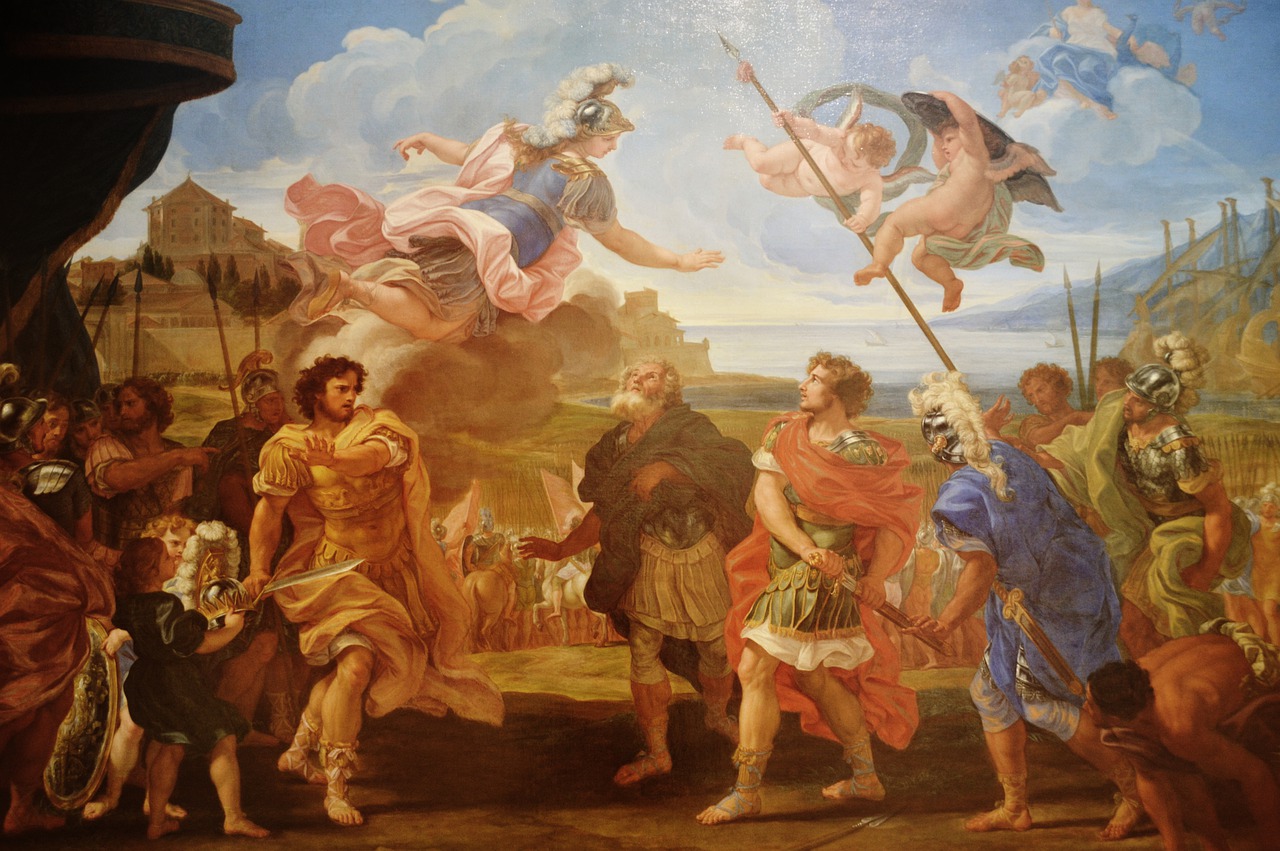
Quarrel of Achilles and Agamemnon, Giovanni Battista Gaulli, il Baciccio
2. The same quotation in Politics IV 4, 1292 a13
In Book IV of the Politics, Aristotle distinguishes between different kinds of democracy: one of them is based on the rule of law; in another one, the council’s decrees take precedence even over the law. The demagogues, he says, arise in the latter, where the people are “a monarch composed by many members, for in them the multitude is not sovereign individually, but collectively”. This distinction points towards the following conclusion: when a multitude acts jointly as a monarch, without abiding by the law, the people become despotic and ends up exalting the sycophants. Now, upon reaching this point in his discussion —where he seems to identify collective democracy with lawless government—, Aristotle recalls Homer. It is not clear —writes Aristotle— if, when arguing that “the rule of many is not good”, Homer refers to this collective government by the multitude or to the many “who rule individually”.
In this setting, the verse lacks the rhetorical impact it has in Metaph. XII 10. Aristotle includes it as part of his words and argumentative strategy, thus suggesting that Homer considers a distinction which is similar to the one he is establishing, although it is not clear which of the two forms of democracy is being criticised by the rhapsode when he says “the rule of many is not good”. In fact, the Iliad is obviously not questioning democracy as a system; however, from the point of view of the classification exposed in the Politics, the Homeric quote is consistent. What I mean is: the two very different recipients of Odysseus’ interpellation correspond precisely to the two political subjects in Aristotle’s distinction. Odysseus refers, in the first place, to “each king and outstanding man”, that is, the leaders of each of the Achaean formations, whom —from the perspective of the Politics— could make up a class analogous to “the many who rule individually”. In the second place, Odysseus addresses the soldiers, who would form —according to the classification in the Politics— a certain kind of collective multitude. Odysseus pronounces the cited phrase when he is appealing to the members of the multitude; yet Aristotle detects an ambiguity, for Odysseus’s rebuke to those who flee —“let one be the ruler, one be the king”— concerns both the undifferentiated collective of common soldiers and the leaders who rule individually. And it is precisely this ambiguity which, for Aristotle, makes Homer’s quote valuable, because it emphasises and confirms the distinction between the two forms of democracy he wishes to call attention to.
Something similar occurs in Metaph. XII. Aristotle finds in the Iliad a kernel of truth, expressed in verse but conceptually analogous to his reasoning. It is evident that the analogy between the “one commander” and the uniqueness of the cosmic principle is based on the belief that the two meanings of arché, i.e., (1) command and (2) principle/beginning, must appear together. This condition, Aristotle argues, is perfectly fulfilled by his own conception of the prime mover. This is the idea pervading Chapter 10 of Metaph. XII, and it is confirmed by Homer through Odysseus’s exclamation: the commander must be only one, the sole chief coinciding with the principle (and the reason) which led the Greeks to Troy, namely, Agamemnon and his sullied honour.
The assumption that both meanings of arché coincide is also present in other passages of the corpus, for instance, Metaph. I 2, 982 a16 and b4, where Aristotle describes “the science we seek” —the one that searches for the first causes (aitíai) and the first principles (archai)4— as the most desirable wisdom, for its aim is knowledge itself and no further result: “And the superior (tén archikotéran) science is more of the nature of wisdom than the ancillary; for the wise man must not be ordered but must order, and he must not obey another, but the less wise must obey him”. This science, Aristotle insists, being dominant and superior to the ancillary science (archikotáte dè tôn epistemôn, kaì màllon archikè tês huperetoúses), is that which knows the ends for which each thing should be done, that is, the good in each case and the highest good for the entire nature in general5. In this passage, Aristotle goes even further than in Metaph. XII 10, since he implies that the two senses comprising the objective content of the notion of arché should not only coincide —i.e., that which is arché, qua principle, must necessarily prevail over what it is not—, but also, he suggests, these notes might be legitimately and immediately projected from the subject matter (the arché or archai) into the science which studies such thing and even into whosoever possesses such science. We shall come back to this in the conclusion.
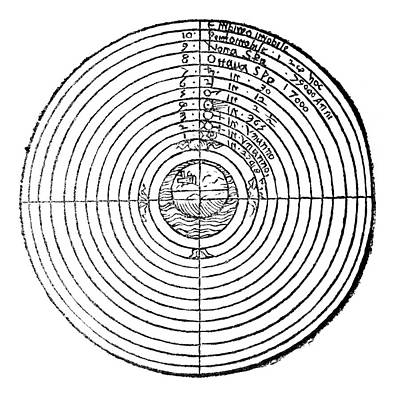
3. The Homeric quote in MA 4, 699b34 and ff.
Homer is invoked again in De Motu Animalium 4 to support the Aristotelian thesis that the cause of motion in everything must be an unmoved mover which is —this is a key point here— external to the universe. Aristotle rejects first the hypothesis of those who believe that the universe is set in motion by a mobile mover. To this end, he resorts to a myth, that of Atlas:
Now those who, in the manner of story-tellers, represent Atlas with his feet on the earth would seem to have a rational basis (apò dianoías) for their use of the fable. They describe him as a kind of radius, whirling the heavens around the poles. Now this would be quite reasonable (katà lógon), since the earth remains still. But if they give such an account they must concede that the earth is no part of the universe [MA 699a28-32; transl. M. Nussbaum].
If everything were moved by Atlas, Aristotle argues, the earth would not be able to resist the pressure of such force, a force capable of moving the entire universe from an initial state of immobility. Neither is it admissible that the force moving the universe be an internal force within the heavens: a force of this kind, he reasons, would not only be capable of moving the heavens but also of destroying them; yet it has already been established in De Caelo6 that the universe is indestructible. Thereupon, Aristotle presents his own solution through Homer’s words, in the passage 699b35-700a2:
Must there be something unmoved and at rest outside what is moved, and which is no part of it, or not? And must this necessarily hold true of the universe as well? For it looks as if it would be paradoxical if the origin of motion were inside. That is why, to those who see it this way, Homer’s words would appear to be well spoken:
But you could not draw from the heavens to the ground
Zeus, loftiest of all, no, not even if you should struggle exceedingly,
till you were weary.
Lay hold of the rope, all you gods and goddesses.7
For what is wholly unmoved cannot possibly be moved by anything. Herein lies the solution of the problem we mentioned some time ago, the possibility or impossibility of the dissolution of the composition of the heavens, given that they depend (értetai) on an unmoved origin.
Just like Homer’s Zeus, him alone supreme and unmoved, outside heaven, apart from and over the rest of the gods, so does the prime mover move. Aristotle poses the problem —also argued by him in Phys. VIII, Metaph. XII and in De Caelo— as a contrast between two mythical discourses: that of Atlas, with his foot set on the universe and imparting a force capable of moving it8, and that of Zeus, immovable above everything else. Rival myths illustrating rival scientific discourses. Aristotle states it clearly: those who resort to the myth of Atlas to support this thesis have a rational basis and seem to speak intelligently; but Aristotle unfolds the reasoning which, as he thinks, underlies the myth and expounds his own reasons to reject both the myth and the underlying astrophysical hypothesis. This is a clear example of the dialectical use of myth, as noted by the interpreters9. But in this case, in which so many elements of the Aristotelian explanation are elided, the preference for the hypothesis of a separate, unmoved prime mover can only be understood by knowing the context of the verses of the Iliad.
Book VIII begins with a gathering of the gods in the peak of Mount Olympus: they have been summoned by Zeus, who intends to help the Trojans and fulfil the promise he had made at the end of Book I10 to Thetis, the mother of a still aggrieved Achilles. Knowing that some divinities are determined to take part in this battle, Zeus threatens anyone who dares to defy his authority. Try —he says— stretching a golden rope in heaven, and you will see that even if you all, gods and goddesses, cling to it, not even thus could you move Zeus from the peak of the universe. Boasting his power, Zeus implies that nothing will be capable of displacing him from his dominant position.
In MA. 4, Aristotle is discussing with those who suppose that the mover of the universe is mobile and is within the heavens; but after expounding that thesis and highlighting some absurdities derived from it, he defends his own position negatively, without developing a positive argument for the necessary immobility and exteriority of the prime mover, as he does in other writings. MA illustrates these two philosophically fundamental aspects through that which Homeric poetry —and Zeus’s figure in it— let the audience guess: Zeus in the summit, above and apart from the battle which is about to begin, and at a noticeable hierarchical distance from the rest of the gods, brings to mind his exteriority (once again, through the semantic aspect related to command, proper to the notion of arché). Furthermore, his unyielding, inalterable position expresses the immobility of the principle. The function of poetry and the mythical element here is not —as it is often said— to arouse the emotions of those who are taught; rather, it complements a philosophical argument by including a piece of information which is not emotional —although it may be associated (or not) to an aesthetic or emotive experience— but is there to seal the argumentation with precise information.
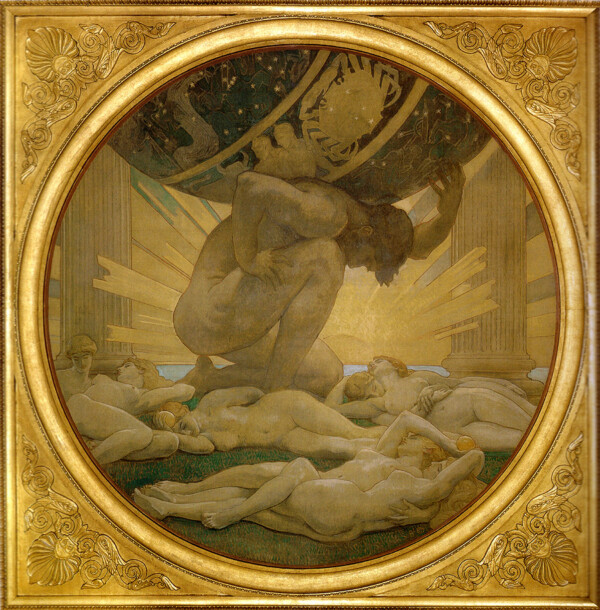
Atlas and the Hesperides, John Singer Sargent
4. Poets, mythology and argumentation of the first philosophy
In Metaph. I.2, 982b 11 ff., Aristotle alludes to the link between mythical, mythological and poetic discourses, on the one hand, and first philosophy, on the other hand. With a view to divesting first philosophy of any commitment to productivity, he supposes a certain genealogy of the philosophical profession, saying:
For it is owing to their wonder that men both now begin and at first began to philosophize; they wondered originally at the obvious difficulties, then advanced little by little and stated difficulties about the greater matters, e.g. about the phenomena of the moon and those of the sun and the stars, and about the genesis of the universe. And a man who is puzzled and wonders thinks himself ignorant (whence even the lover of myth is in a sense a lover of wisdom, for myth is composed of wonders); therefore since they philosophized in order to escape from ignorance, evidently they were pursuing science in order to know, and not for any utilitarian end.
Myths come from the same factory of wondrous and unknown things which nourishes philosophy at first. Besides, the myth-maker acknowledges his own ignorance. Thus, Aristotle issues temporary philosopher credentials for myth lovers11; however, taken in isolation from the concrete use of mythical examples, this assertion might give us an insufficient idea of the value ascribed to the inclusion of Homeric poetry in philosophical thought. Some authors consider that in Aristotle the relation between philosophy and mythical theology falls within a cyclical historical view, similar to that put forward by Plato in the Timaeus and in the Laws III: the history of humankind is full of periodical catastrophes which destroy culture “but leave us vestiges preserved by myths in the memory of survivors”. In this line, Barbara Botter affirms that, for Aristotle, “myths about the gods are the procedure which reunites the current era with the previous civilisation cycle (…); the fruits of a dispersed wisdom, the reasons for its existence may only surface by recovering that wisdom itself”. And she insists: “Therefore, we should not be exceedingly fast in drawing the conclusion that Aristotle considered myths to be allegorical expressions of a rational teaching. For Aristotle, myths do not owe to the need of instruction, but to the need of acting upon the passions”12.
I would like to challenge this kind of interpretation, which to some extent is also adopted by Martha Nussbaum13; in part, I have already attempted to do so, but I wish to question it otherwise, and for another reason: because it suggests that the efficacy of a poetic quote has nothing but an emotional impact upon its recipient, implying that this emotive persuasion has no bearing on the rationality of the argument; this entails, in a way, a correlation between the efficacy of poetry and the cognitive disability of its audience. According to this thesis, Aristotle includes the mythological component in his —theological— argumentation only as a rhetorical stimulus acting upon the receiver’s emotions. On the contrary, I think that for Aristotle the issue of an argument’s efficacy not only concerns persuasion —understood as adapting discourse to the capabilities of the receiver—, but also, fundamentally, the philosopher producing a philosophical discourse and his capability of assessing the kind of argumentation proper to the subject matter of which such argumentation represents an epistéme. The epistéme we seek, first philosophy or theology, is also vulnerable to efficacy, understood as a way to develop arguments according to the subject they are oriented towards.

Aristotle
In Metaph. II, Aristotle attends to this matter. He wonders how to be efficient in teaching, considering both the reception of discourse (the disposition and competence of the audience) and the producer’s strategies, that is, the essential ability to know and to anticipate, in each case, the kind of argument best adapted to the kind of knowledge sought or to be imparted, according to its subject. In the first part of the passage (994b32-995a6), Aristotle holds:
The effect which lectures produce on a hearer depends on his habits; for we demand the language we are accustomed to, and that which is different from this seems not in keeping but somewhat unintelligible and foreign because it is not customary. For the customary is more intelligible. The force of custom is shown by the laws, in whose case, with regard to the legendary (tà mythóde) and childish elements in them, habit has more influence than our knowledge about them.
Here Aristotle is undoubtedly referring to reception, and he stresses how habits (éthe) determine the accessibility of discourse. There follows a general remark on the reception of different ways of argumentation:
Some people do not listen to a speaker unless he speaks mathematically, others unless he gives instances, while others expect him to cite a poet as witness. And some want to have everything done accurately, while others are annoyed by accuracy, either because they cannot follow the connection (dià tó mé dýnasthai syneírein) or because of its spiritual shallowness (dia tèn mikrologían); For accuracy has something of this character, so that as in trade so in argument some people think it mean 14 [Translation D. Ross, modified].
Different habits or different cultural dispositions determine the greater or lesser acceptance of the different kinds of argumentation. There is a first general remark on reception, with a classification of the kinds of argument. The second phrase refers to a characteristic of a particular kind of argument: some expect pánta akribôs, while others are annoyed or disturbed by exactness. Who are these “some” who become upset by exactness? As the context lets us infer, Aristotle himself can be included among these “some” who feel annoyed by indiscriminate exactness, since he cautions —probably the Pythagoreans or some Pythagorean Platonic thinkers— against applying this kind of argumentation to an object unsuited for it:
The minute accuracy of mathematics is not to be demanded in all cases, but only in the case of things which have no matter…
Immediately after this phrase, Aristotle reveals that, for him, detailed knowledge on how to adapt argumentative strategies has to be part of the philosopher’s education:
Therefore one must be already trained to know how to take each sort of argument (diò deî pepaideûsthai pôs hékasta apodektéon), since it is absurd to seek at the same time knowledge and the way of attaining knowledge; and neither is easy to get.
It is not just part of the philosopher’s learning: it is so in virtue of the relationship he establishes with his subject matter, not with the receivers in the process of communicating his knowledge. The philosopher must know beforehand which is the kind of argument which will enable him to obtain knowledge in his specific domain. The warning, as we have seen, comes together with the realisation that some philosophers fail in this respect: by applying the minute accuracy of mathematics to everything, they do not adopt a kind of reasoning proper to the subject they intend to study. In this passage, I insist, Aristotle has in mind not so much (or not just) the receivers, but those who produce a philosophical or scientific discourse in relation to their corresponding subjects matters and methods. The message is aimed at philosophers, not at an imaginary audience suffering from mikrología, basically emotional people, lacking the degree of rationality necessary to understand theology. With the examples of Metaph. and MA, I have tried to show that including the Homeric Zeus in the treatment of the prime mover has not a merely emotional import, for sometimes it does not (just) add an element of persuasive efficacy by appealing to emotions; rather, knowledge of poetry and of the meaning attached to the mythological characters invoked in argumentation brings along a piece of information which makes it possible to define a subject matter —in this case, the subject of theology—,thus completing the form of the argument itself.
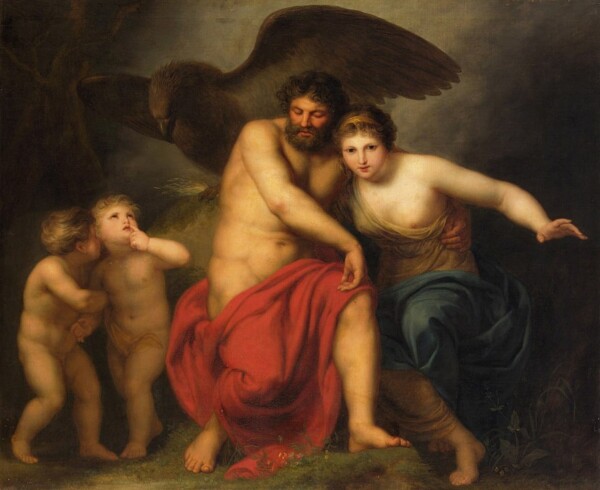
Zeus and Hera on Mount Ida, Andries Cornelis Lens
5. Homeric quotes in De Philosophia
One last remark on Homer’s poetry in Aristotelian theology. As it is known from the testimony of Sextus Empiricus and Cicero, among others, in Book III of his lost dialogue, De Philosophia —the section dedicated to the notion of god—, Aristotle cited Homer profusely. In the two versions of fragment 12A15, we are informed that, according to Aristotle, “the notion of the gods has developed in men on the basis of two principles”: the paranormal phenomena of divination, and the observations of regularity and perfection in astronomical phenomena.
And Aristotle said that the conception of gods came into being in humans from two starting-points, the things that happen to the soul and the things in the sky. […] At any rate he accepts that Homer too noticed this; for he depicted Patroclus at the point of dying foretelling the death of Hector, and Hector foretelling the end of Achilles. From these things, then, he says, human beings supposed that there was something divine, that which is in itself like the soul and most knowledgeable of all things [S.E. Phys. I 20-21, transl. R. Bett].
Though more succinctly, Cicero tells us the same. Even more interesting is fragment 12B16, where Sextus Empiricus explains more clearly what Aristotle had in mind when he claimed that celestial phenomena had inspired the notion of god:
And some turn to the undeviating and well-ordered motion of the heavenly bodies, and say that the starting-point of conceptions of gods was initially from this. For just as, if someone sitting on Mount Ida at Troy17 was looking at the Greek army advancing on the plain with great order and arrangement, Knights first with their horses and chariots, Foot-soldiers behind18, such a person would absolutely have come to a conception of the fact that there was someone organizing such an arrangement and commanding the soldiers ordered under him, like Nestor or some other hero, who knew how to put in order horses and shield-bearing men19. And in the same way as the person experienced with ships understands, immediately on observing in the distance a ship with a favorable wind behind it and its sails all ready, that there is someone directing it and bringing it to the intended harbor; so those who first looked up at heaven and observed the sun running its course from rising to setting, and the well-ordered dances of the stars, would look for the craftsman of this most beautiful design, guessing that it did not happen by accident, but by some more powerful and imperishable nature, which is god (S.E. Phys. I 26-27).
Two remarks concerning this extraordinary passage, full of Platonic influence. Once more, in De Philosophia, in the context of demonstrating the existence of divinity with those characteristics proper to his own notion of god, Aristotle resorts again to the Iliad. In the first place, to show that Homer had already acknowledged the divine origin of the prophetic gifts he attributed to Patroclus and Hector (12A). In the second place, to present a new version of the old Platonic theory (which would have a fruitful life in the history of philosophy) that astronomic perfection is unmistakable evidence of the existence of god. Aristotle is not satisfied with presenting the regularity of the stars as proof of the existence of a superior order: he puts forward an illustration of such analogy and takes the same military theme we saw at the beginning of this text, that of Metaph. XII 10. This time it is not about any army taken in general, but about the specific situation of the Achaean armies ready for battle at the gates of Troy. Aristotle invites us to place ourselves atop Mount Ida, oft mentioned in the Iliad: if we observed therefrom the beautiful layout of the Greek military formation, we would have to realise that such order could not have come out of sheer spontaneity, that there must be someone behind, ordering and commanding. Once again, the association between the principles of order and command which characterise the principle, the unmoved prime mover.
We could say, nevertheless, that the relation between poetry, politics and theology proposed by this text is slightly different from what we found in the previous passages, since, unlike what occurs in Metaph. XII 10 or MA., the purpose here is not only to argue for a certain property of command and transcendence possessed by the divine —understood as unmoved prime principle—, but also to explain why men began to presume the existence of the gods. And given the slightly different perspective, Aristotle here is not only showing himself prone to argue using the words of the poet; he feels qualified to take his place and develop his reasoning by adopting Homer’s own stance, like a modern journalist in the midst of a war who can witness the action at a certain distance and, at the same time, organise and command the account from such vantage point. However, once again, let us not hurry. Is it the position of the poet that which Aristotle assumes? Strictly speaking, as a philómythos like Aristotle must have known well, in the Iliad, the one regarding the Achaeans from the summit of Mount Ida is not precisely Homer. It is Zeus. Quite a subtle way for Aristotle to explain wherefrom he wishes to observe. After all, this is nothing but what he states at the beginning of the Metaphysics. Aristotle affirms there that “the science we seek, that of the first causes and the first principles (archai)”20, “the most desirable wisdom”, is also “the superior (tén archikotéran) science”, which is “more properly wisdom” than others. And finally, the wise man, the one who is in possession of such a science, “must not be ordered but must order, and he must not obey another, but the less wise must obey.”
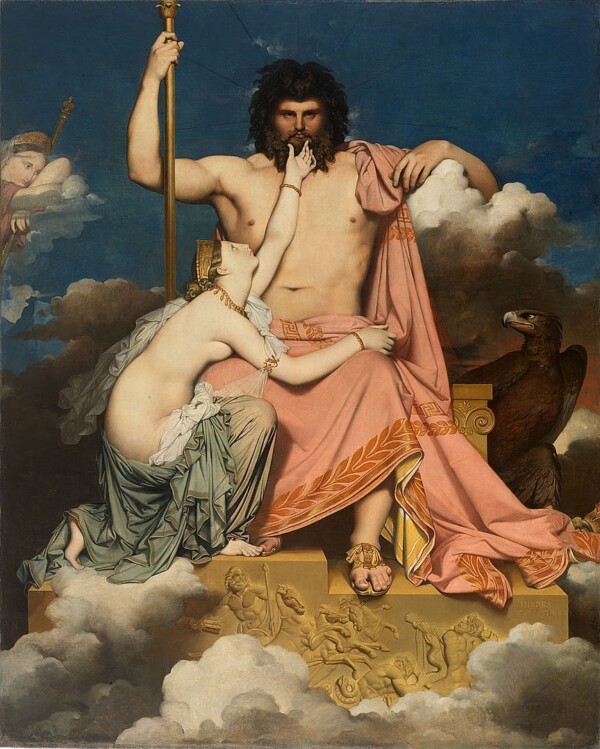
Jupiter and Thetis, Jean Auguste Dominique Ingres
NOTES
[1] Aristotle considers that, at least regarding the unique and supreme character of the first principle, Homer holds essentially the same idea as himself, in contrast with other poets and mythologists (on the distance separating him from other poets or mythologists, see Met.1071b26 and ff.).
[2] G. E. Howes, “Homeric quotations in Plato and Aristotle”, Harvard Studies in Classical Philology 6 (1895), 153-237, identifies 139 Homeric quotations in Aristotle: fifteen of them, in the fragments of the exoteric writings; two in the Problems; and another six in the pseudo-Aristotelian treatise De Mundo.
[3] This could be another argument against reading this reference as intending to lend theological legitimacy to monarchy.
[4] Metaph. I 2, 982b 7-10.
[5] See the affinities between this expression and the beginning of Metaph. XII 10.
[6] Cf. Cael. I, 10-12.
[7] Il. VIII 20-22. The order of the verses appears modified, but it is not clear whether such variation owes to Aristotle himself, as argued by M. Nussbaum (1978:320-21), or to a copyist, as proposed by Howes (1895: 232).
[8] Aristotle uses different versions of the same myth in different contexts: in Metaph. V 23, 1023a20 and ff., and in De Caelo II 1, 284a20 and ff., he alludes to Atlas as supporting the world. In MA, he has another version in mind: Atlas does not support the universe, but moves it. Cf. Nussbaum (1978: 300- 4).
[9] Cf. B. Botter (2005: 80 and ff.).
[10] Cf. Il. I 523.
[11] The expression philómythos clearly alludes to those who like myths: Aristotle does not specify whether they are those who make them (who must obviously like them as well) or those who, like him, just consume them.
[12] See Botter (2005: 82).
[13] Nussbaum (1978: 321) holds that “we are not meant to look too closely at the context” of the Homeric quote in MA, for it is there just in virtue of its “rhetorical effect”.
[14] Metaph. II 3, 995a6-12.
[15] Fragment 12A (Walzer and Ross) = Sextus Empiricus Phys. I 20-23, and Cicero, Div. ad Brut. I. 30, 63-64.
[16] Fragment 12B (Walzer and Ross) = Sextus Empiricus Math. IX (Phys. I) 26-27.
[17] See Il. III, 277, and XIV, 270, among others. See also Plato, R. III, 391e, and in Lg. I, 625b and 682b. Cf. Aristotle, Rh. II, 24.
[18] Il. IV, 297.
[19] Il. II, 554.
[20] Metaph. I 2, 982b 7-10.
CITED BIBLIOGRAPHY
Botter, B. (2005), Dio e il divino in Aristotele, Sankt Augustin: Akademia.
Dumoulin B. (1986), Analyse génetique de la Métaphysique d’Aristote, Montreal-Paris: Bellarmin – Les Belles Lettres.
Düring, I. (1966), Aristoteles, Darstellung und Interpretation seines Denkens, Heidelberg (Spanish translation Aristóteles – Exposición e interpretación de su pensamiento, by B. Navarro, Mexico: FCE, 1990; references are taken from the Spanish version).
Halliwell, S. (2000), The Subjection of Muthos to Logos: Plato’s Citations of the Poets, in The Classical Quarterly, Vol. 50, N.° 1, pp. 94-112.
Jaeger, W. (1923), Aristoteles, Grundlegung einer Geschichte seiner Entwicklung, Berlin (Spanish translation Aristóteles – Bases para el desarrollo de su sistema intelectual, by J. Gaos, Mexico: FCE, 1995; references are taken from the Spanish version).
Martín, J. P. (1998), Sobre la cita de Homero que cierra el libro Lambda de la Metafísica de
Aristóteles, in Aristóteles – Primeras Jornadas Aristotélicas Argentinas (H. J. Padrón, ed.), Mendoza: Ed. de la Universidad de Cuyo, pp. 313-321.
Natorp, P. (1888), Thema und Disposition der aristotelischen Metaphysik, in Philosophische Monatshefte N.° 24, pp. 37-65.
Nussbaum, M. (1978), Aristotle’s De Motu Animalium – Text with translation, commentary and interpretive essays by M.N., Princeton: PUP, 1978.
Published in Μαθηματα – Ecos de filosofía antigua, Selection of works from the III Congreso de la Asociación Latinoamericana de Filosofía Antigua (Lima, Novembr 9th, 10th and 11th, 2013), R. Gutiérrez ed. (In collaboration with A. Alván), Lima, Fondo editorial de la Pontificia Universidad Católica del Perú, 2013; pp.357-372 – ISBN 978-612-4146-50-3.


Leave A Comment